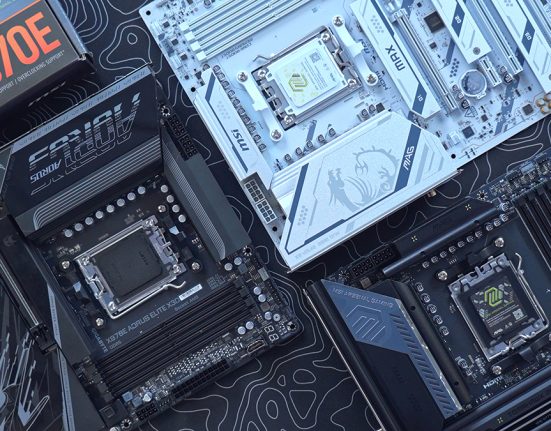The AMD Radeon RX 7700 XT is an excellent graphics card that offers solid 1440p performance in the latest titles. The RX 7700 XT is a big hit in the mid-range market with a solid MSRP that easily beats the competition. However, with many RX 7700 XT options readily available, determining which RX 7700 XT offers the best value isn’t the most straightforward task. That’s why we’ve done all the hard work for you, testing a fantastic selection of RX 7700 XT GPUs and picking out the cards that cater to a vast range of use cases and budgets.
This buyers guide delves into the range of RX 7700 XT graphics cards, examining the specs, features, design, and pricing. We assess all these features to determine which card offers the most robust value proposition.
The Best RX 7700 XT GPUs
1. Gigabyte RX 7700 XT Gaming OC

The Gigabyte RX 7700 XT Gaming OC offers noticeable boosts to both the base and boost clock speeds while providing stronger thermals due to its triple-fan design. This naturally improves framerates in several games while ensuring your card stays cool even within more challenging workloads.
The Windforce cooling system is responsible for high-efficiency heat dissipation thanks to the unique fan blade design and large heatsink underneath the GPU’s shrouding. Gigabyte’s 3D active fan system will also turn off the fans once your system reaches a lower load, minimising any excess power draw.
| Key Specs | Gigabyte RX 7700 XT Gaming OC |
|---|---|
| Video Memory Capacity | 12GB GDDR6 |
| Bus Width | 192-bit |
| Base Clock Speed | 1.7GHz |
| Boost Clock Speed | 2.59GHz |
| Stream Processors | 3456 |
| Ray Accelerators | 54 |
| Length | 302mm |
| Power Draw | 245W |
The Gigabyte RX 7700 XT Gaming OC’s MSRP price point is its biggest strength. Few GPUs can compete with AMD’s original launch price while offering solid performance improvements across the entire design. Hence, we believe the Gigabyte Gaming OC variant of the RX 7700 XT is worthwhile.
The RX 7700 XT Gaming OC’s aesthetics are relatively simple. Its all-black shroud sports a few etchings to create a cybernetic look. Ultimately, this restricted and somewhat basic design won’t be for everyone, especially if you’re building a lighter-themed system.



Suggested Article: Best Power Supplies to Buy for AMD Radeon RX 7700 XT
2. Sapphire RX 7700 XT Pulse

As AMD’s premier partner brand, the Sapphire RX 7700 XT Pulse’s inclusion in this roundup is no surprise. This GPU is the closest you’ll get to the reference card that AMD provides but with an alternative look. Despite the lack of performance enhancements, the original RX 7700 XT design has more than enough firepower to provide smooth 1440p gameplay in various titles.
The only significant difference compared to the reference card is the aesthetic, as the Sapphire Pulse boasts a more eccentric black and red colour scheme across the shroud. This allows Sapphire’s variant to stand out slightly more than the monotone look found on the reference design, adding some much-needed variation to the cheaper MSRP options.
| Key Specs | Sapphire Pulse RX 7700 XT |
|---|---|
| Video Memory Capacity | 12GB GDDR6 |
| Bus Width | 192-bit |
| Base Clock Speed | 1.7GHz |
| Boost Clock Speed | 2.54GHz |
| Stream Processors | 3456 |
| Ray Accelerators | 54 |
| Length | 280mm |
| Power Draw | 230W |
While the Sapphire RX 7700 XT Pulse’s price is pretty tempting, the lack of any bonuses other than a slightly altered design is disappointing. A few different cards come in at MSRP and provide some nice extras, making them a worthwhile consideration. However, when those options aren’t available, the Sapphire RX 7700 XT Pulse comes at a price we can’t argue with.
3. ASRock Challenger RX 7700 XT

The ASRock Challenger version of the RX 7700 XT is an excellent pickup for those looking for something different. One of the main qualities of this card that particularly stands out is its unique design. The ASRock Challenger cards are striped towards the top-right of the card, offering some contrast compared to the sea of black-themed components.
This card features a hefty metal backplate that provides some stability. The boost clock speed has been slightly increased, enhancing framerates in several games. Additionally, this card is priced below MSRP, hovering around $389 at the time of writing.
| Key Specs | ASRock Challenger RX 7700 XT |
|---|---|
| Video Memory Capacity | 12GB GDDR6 |
| Bus Width | 192-bit |
| Base Clock Speed | 1.7GHz |
| Boost Clock Speed | 2.58GHz |
| Stream Processors | 3456 |
| Ray Accelerators | 54 |
| Length | 267mm |
| Power Draw | 230W |
Regarding the cons, this GPU’s biggest weakness is its thermals. Two of the other cards in this roundup (the Gigabyte Gaming OC and ASUS TUF Gaming OC) offer triple-fan shrouds, so cooling is pretty strong. The ASRock Challenger can’t quite compete with these GPUs in terms of temperature.



4. ASUS TUF Gaming RX 7700 XT OC

The TUF Gaming RX 7700 XT OC Edition offers an industrial appearance used throughout the ASUS TUF Gaming collection. Compared to AMD’s reference model, the TUF Gaming RX 7700 XT OC design looks significantly bulkier due to its less rounded form factor. The lighter shade and hint of RGB lighting allow this design to stand out more than most, making it a solid choice for a luxurious gaming PC.
One of this card’s main strengths is the enhanced boost clock capability. With a stronger clock speed, gamers can expect better performance in several titles and applications. The TUF RX 7700 XT’s OC mode reaches 2.59GHz, which will provide a noticeable improvement to framerates in your favourite titles.
| Key Specs | ASUS TUF Gaming RX 7700 XT OC |
|---|---|
| Video Memory Capacity | 12GB GDDR6 |
| Bus Width | 192-bit |
| Base Clock Speed | 1.7GHz |
| Boost Clock Speed | 2.59GHz |
| Stream Processors | 3456 |
| Ray Accelerators | 54 |
| Length | 319mm |
| Power Draw | 230W |
Unfortunately, this ASUS OC variant is not an MSRP card and comes in close to $500. Ultimately, the slightly more powerful sibling (the RX 7800 XT) becomes available at this price, which is worth considering if you’re looking to maximise your framerates at 1440p.



How We Tested the Best RX 7700 XT Graphics Cards
To provide informed product recommendations, we test all of our graphics cards rigorously at a range of varying resolutions, alternating settings within several AAA and Esports titles. To ensure our testing is fair and repeatable across the board, all of our settings are detailed in a How We Test Graphics Cards article. There, you’ll find an in-depth rundown of our full testing suite for GPUs.
Starfield
Settings: 1440p, Shadow Quality High, Indirect Lighting High, Reflections High, Crowd Density High, Particle Quality High, Volumetric Lighting High, Motion Blur off, GTAO Quality High, Grass Quality High, Contact Shadows High VSync Off, DLSS/FSR OFF
For our first benchmark, we fired up Starfield and ran the game at 1440p high settings. Performance in this game can only described as average. All of the cards that we’ve tested in this game did suffer to a degree, which is a testament to how unoptimised this title is. But regardless of the poor optimisations, the RX 7700 XT pushed through offering around 74FPS on average, which is more than can be said of the 4060 Ti.

Warzone
Settings: 1080p, DLSS: On/Off, Texture Resolution High, Texture Filter Anisotropic High, Level of Detail High
In Warzone 2.0 at high settings with FSR/DLSS settings enabled, the RX 7700 XT managed to hit 145FPS on average. This makes it an ideal choice for competitive gaming at 1080p, as it will match the output of a 144Hz gaming monitor. This result is also fairly impressive when compared to the rest of the market, as the RX 7700 XT outperformed the RX 6800 and RTX 4060 Ti.

Hogwarts Legacy
Settings: 1080p, Effects High, Material High, Fog High, Sky High, Foliage High, Post Process High, Shadows High, Textures High, View Distance High, Population High, Anti Aliasing TAA High, Windowed Fullscreen
In Hogwarts Legacy, the RX 7700 XT impressed yet again. Compared to the rest of the mid-range market, this GPU managed to eclipse them all, outperforming the likes of NVIDIA’s RTX 4070 and AMD’s own RX 6750 XT pretty comfortably. With an 111FPS average at 1080p high settings, this graphics card will provide a smooth ride through this wizarding world.

Frequently Asked Questions
Does the RX 7700 XT Support FSR 3?
Yes. FSR 3 is set to run on all of AMD’s Radeon 7000 series graphics cards, and even supports NVIDIA and Intel GPUs as well.
How Much Does an RX 7700 XT Cost?
On release, the RX 7700 XT stands at an MSRP of $449. However, alternative models will vary in price and could easily reach up to the $500 mark.
Is 12GB VRAM Good for Gaming?
12GB VRAM should be more than enough for most games at 1440p and 4K. However, the increasing demands of games could see this change soon.


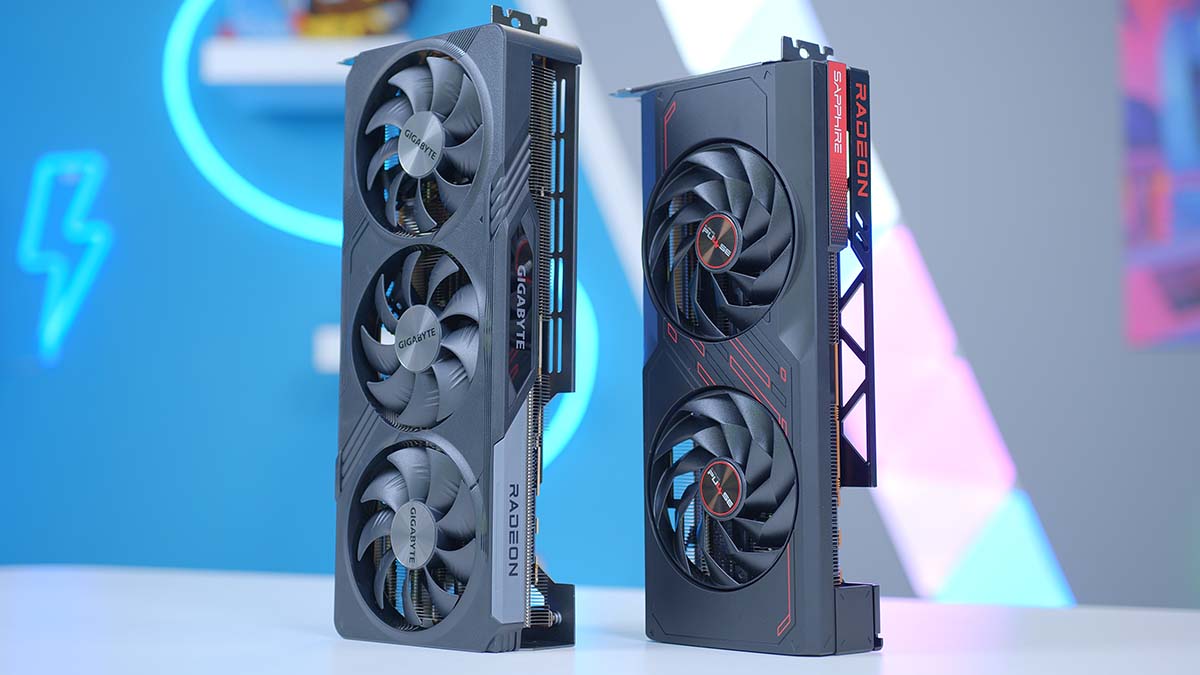
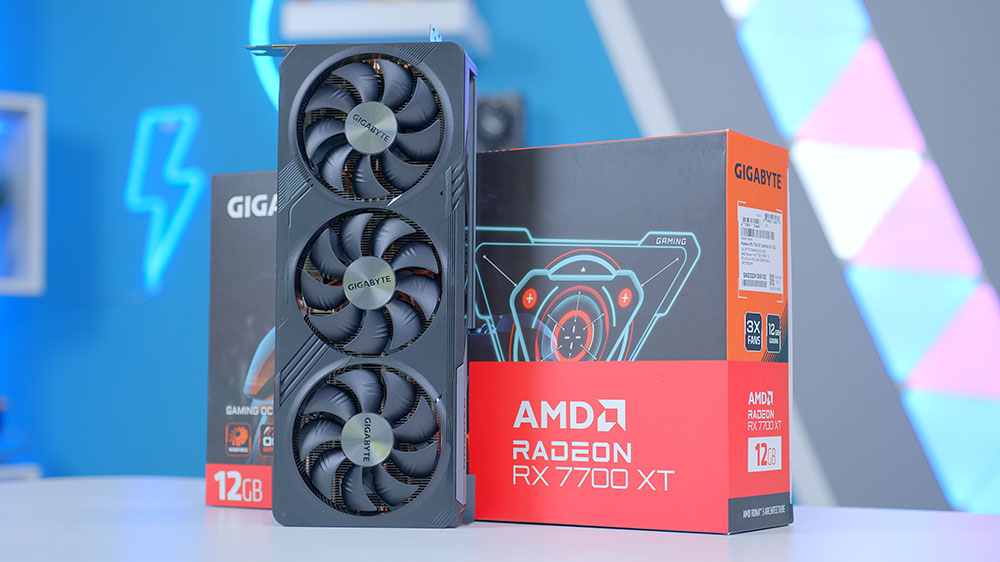
![FI_[DM89] Phanteks Evolv + AORUS 5090 9850X3D Gallery (8)](https://geekawhat.com/wp-content/uploads/2026/02/FI_DM89-Phanteks-Evolv-AORUS-5090-9850X3D-Gallery-8-551x431.jpg)
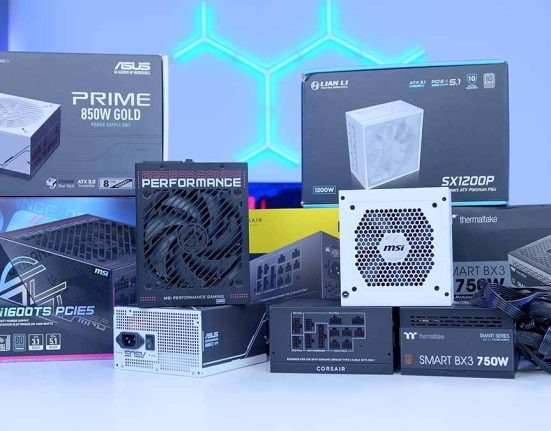
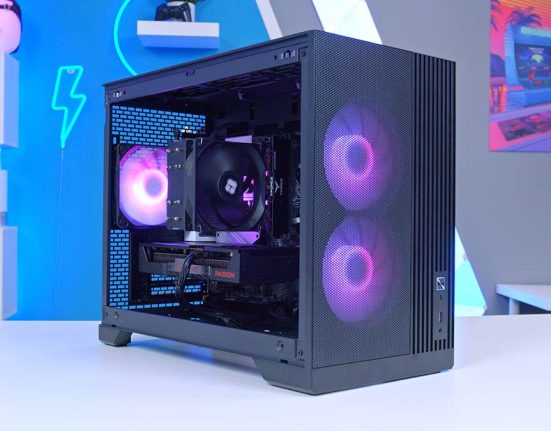
![FI_[DM87] HAVN BF & RTX 5090 Build](https://geekawhat.com/wp-content/uploads/2026/01/FI_DM87-HAVN-BF-RTX-5090-Build-551x431.jpg)
![FI_[DM86] Montech King 45 Pro + RX 9070](https://geekawhat.com/wp-content/uploads/2026/01/FI_DM86-Montech-King-45-Pro-RX-9070-551x431.jpg)
